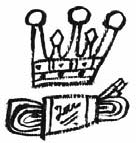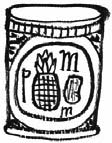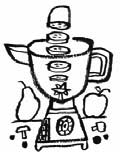The Yggyssey (9 page)
Authors: Daniel Pinkwater

Neddie, Seamus, and I took the bus downtown, and when we arrived things were in full swing. There were lots of people wandering around, and the shops and stalls were selling skulls made of candy, and toy skeletons. There were decorations, tombstones with funny epitaphs, and more skeletons dressed up in fancy costumes, and strolling musicians. There were signboards in Spanish and English, explaining what the Day of the Dead was all about.
It turned out the holiday goes back to the Aztecs. It started in Mexico and is still a big deal there, but it has spread to some other Latin American countriesâalso the Philippines and parts of the United States.
It happens at about the same time as Halloween, All Saint's Day, and All Soul's Day, but the mood is happy rather than spooky. The living people celebrate the lives of the dead and decorate their graves with orange marigolds, also known as
flor de muerto,
or "flower of the dead." The whole thing is upbeat and happy, and there are toys for dead children, aka
los angelitos,
or "little angels," bottles of tequila for dead adults, candy left for the dead, and little trinkets. At home,
the people make shrines and offer candied pumpkin, and
pan de muerto,
or "bread of the dead," and make those sugar skulls with the names of dead friends and relatives decorating them. The idea is to invite the dead into the homes so they can enjoy the "spiritual essence" of the foodâI suppose they sniff it, like Billy the Phantom Bellboy does. They also put out pillows and and blankets so the dead can have a rest. And they write funny epitaphs, and make funny dressed-up skeletons, and draw funny cartoons of funny dressed-up skeletons.
What I got from reading all the signboards and observing all that was going on was that the dead love a good party, and on DÃa de los Muertos, everybody makes sure it's the best one possible.
What I liked best were the little mariachi bands, usually two or three guitars and a trumpet, maybe an accordion. They walked around playing, and would stop and play for people, and sing these Mexican hillbilly songs. The musicians all had Mexican cowboy suits, and big sombreros, and had bushy mustaches. They were great, and they seemed to be having the most fun of anybody.
Except this one bandâthe Mexican guys looked slightly bugged. It was also the only band that had a bongo player, and the bongo player was Bruce Bunyip! He had a set of bongo drums hanging from his neck on a string, and
a cheap souvenir sombrero he had bought, or probably stolen, from one of the stands. He was drumming up a storm, but what he drummed didn't necessarily go with what they were playing. You could see the band wished he would go away but weren't sure of how to politely get rid of him.
"Bruce!" I said.
"Babe!" he said. "Did you come down here to hear me make the scene with these Mexi-cats?"
The mariachis took advantage of Bruce's stopping to talk with me to move away, swiftly.
"You sure were doing a lot of drumming," I said.
"They're a little square, but I showed them a few things,"Â Bruce said. Then he saw Neddie and Seamus. "Hey, man! Hey, man! Are you taking care of my chick?" Meaning me.
"She's your chick?" Neddie asked.
"What can I say? The babe digs me," Bruce Bunyip said.
"Amazing!" Seamus Finn said.
"Fascinating!" Neddie Wentworthstein said.
"Oh, crud!" I said.
"You like him?" Seamus asked me.
"I'm ambivalent," I said.

"So what was it that Melvin expected us to learn at the DÃa de los Muertos celebration?" Neddie asked. We were having crullers and coffee at the Rolling Doughnut, our usual Sunday-morning hangout.
"That the dead love a good party?" Seamus guessed. "What does that tell us about ghosts disappearing? Isn't that what we were asking him about?"
"But are ghosts really disappearingâI mean, permanently?" I asked. "We thought Billy had vanished, but he turned up at the restaurant the other night."
"Yes, and he knew about the disappearing ghosts but refused to tell us anything," Seamus said. "Said he was sworn to secrecy, and we couldn't drag a single word about it out of him."
"So something is going on, and he knows what it is, but we can't find out," Neddie said. "And if Billy won't talk, I don't see much chance for finding outâI mean, he's sort of our personal ghost. He's our friend."
"We could ask Melvin to clarify," I said.
"Yeah, right," Neddie said.
"Oh, sure," Seamus said. "You've heard Melvin clarify. He just makes things muddier and muddier."
"Well, I'm going to get to the bottom of it," I said.
"Good luck," Neddie said.
"You'll just be chasing your tail," Seamus said. "It's one of those ghostly secretsâyou can't find out a thing."
"Care to make a little wager that I can't find out?" I asked.
"Okay. If you find anything out, we'll pay for your crullers for two monthsâwhen you give up, and you will, you have to buy us each crullers for a month. Fair?" Neddie asked.
"Perfectly fair," I said.
They have their ghost, and I have mine,
I thought.

Neddie's father is the Shoelace King. When you buy shoelaces, if you look at the little paper wrapper, nine times out of ten it will say
WENTWORTHSTEIN SHOELACES
. So they are incredibly rich. Mr. Wentworthstein likes saying that he started his fortune on a shoestringâhe works it into every conversation.
Mr. Wentworthstein does projects. One of his projects was having scientists develop a shoelace that can't be broken. It took a year, and a huge sum of money, but they came up with oneâonly it was half an inch thick. Not ready for the marketplace, Mr. Wentworthstein said. Another project was a toy that was supposed to become a huge fad, like the yo-yoâit was called the Shoe-la Hoop, and it was sort of like a lasso, and also a hoop you could swing around your head, and sort of dance and gyrate inside of. He got all of us kids to learn how to play with it, which was hard to doâalso, it was boring. He had thousands of them made and got them into stores. Nobody bought even one. Mr. Wentworthstein's current project is the Museum of the Shoelace. Neddie's mother had made a big basketful of corn muffins, and Seamus Finn and I had been invited to help eat them. While we slathered butter and strawberry jam on the muffins, Mr. Wentworthstein told us about the Museum of the Shoelace.
"Before I can open the museum, I have to assemble the collection," Mr. Wentworthstein said. "I already have several exhibits that will be sensational."
"Oh, Father, no one will be interested in seeing shoelaces," Eloise said. Eloise is Neddie's sister, who is older and is going to be an actress.
"On the contrary, daughter," Mr. Wentworthstein said. "People will flock to my museum. They will come by the thousands. For example, I have a shoelace which I am pretty sure belonged to General and later President Ulysses S. Grant. Now, that by itself is a crowd-getter. But it gets better. I have shoelaces that belonged to an ancient Roman emperor, Caligula's Ligula. I have a pair of shoelaces made by South American Indians from the skin of the electric eelâthey still have a faint electric current, and we are going to fix it so they light up a tiny lightbulb. I have shoelaces that belonged to Lord Buckley. They are plaid. And of course, the longest shoelace in the world, a scale model of New York City made entirely of shoelaces, an exhibit of shoelaces of the future, in which you will see the twenty-first-century methods by which shoelaces will be manufactured, and simulated spun glass, titanium, and carbon fiber shoelaces. I have a playable violin with shoelace strings and a shoelace bow. And, there will be occasional exhibits with live animals and peopleâfor example, I will have Mongolian tribesmen in the museum, weaving the traditional shoelaces of their people and answering questions from the public. Now, think of it, childrenâcan you imagine a more exciting museum?"
"These are wonderful corn muffins, Mrs. Wentworthstein," Seamus Finn said.
"Yes, they are, Mother," Neddie said. "No one makes corn muffins like yours."
"There is only one thing missing to make my museum a complete success," Mr. Wentworthstein said. "It is the Devil's Shoestring, the rarest shoelace of all."
"Isn't the Devil's Shoestring a natural wonder, a rock formation or some such thing, in Yosemite or some other national park?" I asked.
"It is also a shoelace," Mr. Wentworthstein said.
"What is it like?" Neddie asked.
"I don't know," said Mr. Wentworthstein. "I just know it is the ultimate shoelace collectible. If any of you children ever hear word of itâwhat it is, where it is, anythingâI hope you will tell me promptly.
"We'll be on the lookout for it," we all said with our mouths full of muffin.

Mrs. Wentworthstein gave me some muffins wrapped in a napkin to take to Kitty Nebelstreif up on the roof.
"These look yummy," Kitty Nebelstreif said. "May I fix one for you? I have some pineapple mango marmalade."
"No thanks," I said. "I am chock full. If I ate another muffin I would fall dead."
"Well, you'll have a cup of blueberry tea," Kitty Nebelstreif said. "Tell me all the news of the outside world."
"Well, this disappearing ghost business has been on my mind," I said.
"They've been clearing out," Kitty Nebelstreif said. "I think half the ghosts are gone from this hotel. I've been getting some good nights' sleep for the first time in years."
"They used to come up here at night and make noise?" I asked.
"Always," Kitty Nebelstreif said. "Ghosts love a good party."
"And you have no idea where they are going or why?"
"Not a clue," Kitty Nebelstreif said. "Mmmmm, these muffins are wonderful."
"Billy the Phantom Bellboy turned up," I said. "I saw him after the ghostly Halloween parade."
"Oh, isn't that fun?" Kitty Nebelstreif said. "I used to go all the time. Did Billy have anything to say about the ghostly disappearances?"
"He said he knew all about it but couldn't tell us a thing. Said he was sworn to secrecy."
"But you plan to find out all about it," Kitty Nebelstreif said.
"You know me well," I said.

